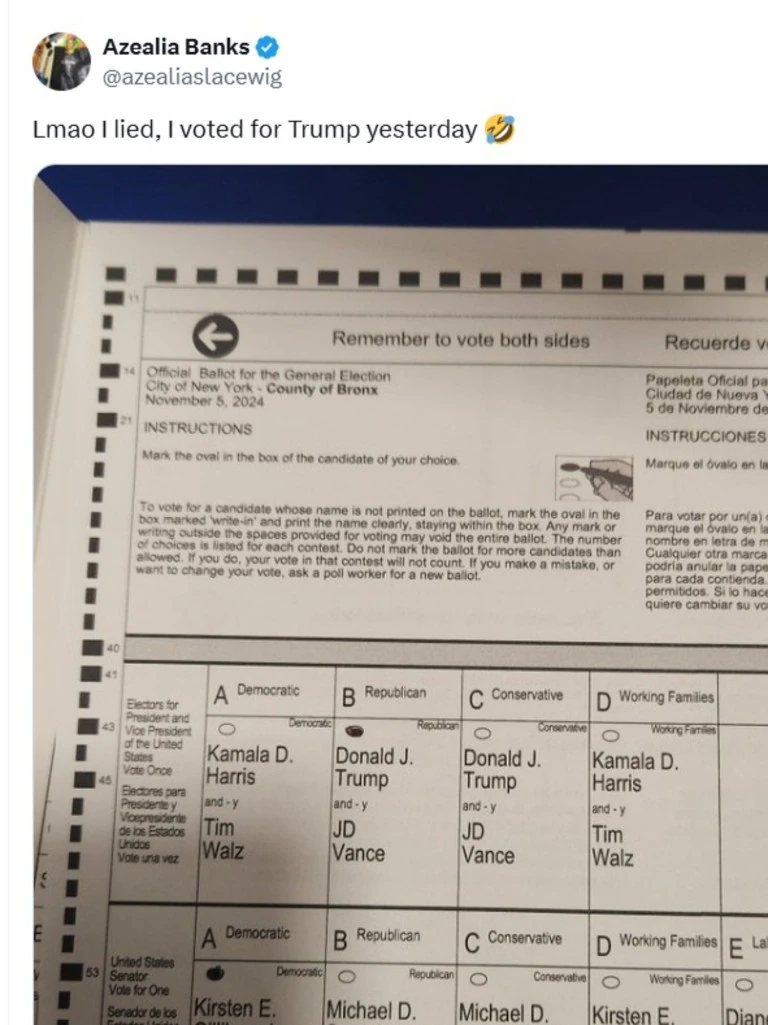Fans Dismayed
Azealia Banks has once again become a focal point of controversy. This time, it is due to her admission about voting in the 2024 presidential election. Initially, the singer and rapper declared her support for Kamala Harris. However, she later revealed that she actually voted for Donald Trump. This dramatic shift has sparked discussions about how Azealia Banks lies to followers and the effects of such dishonesty.
The Shocking Admission: Azealia Banks Lies About Her Vote
On November 6, 2024, Banks posted a photo of her ballot on X (formerly Twitter). The image showed that she had voted for Trump. In her caption, she wrote, “Lmao I lied, I voted for Trump yesterday,” accompanied by a laughing emoji. This revelation came just one day after she publicly endorsed Harris, citing concerns about Elon Musk’s influence in politics. Her initial endorsement seemed to resonate with progressive values. However, her eventual vote for Trump left many fans bewildered.
Backlash from Fans: Disappointment Over Azealia Banks’ Lies
The backlash against Banks was swift and intense. Social media users criticized her for misleading her followers. Many expressed frustration with Banks’ apparent insincerity. Some labeled her as “annoying” while others called her “spineless.” Fans who expected authenticity felt disappointed and angry.One user noted that Banks had alienated her supporters with her shifting political loyalties. Another remarked, “Great job alienating the only people who were actually still supporting you.” Such responses highlight the disappointment felt by fans who looked to Banks for guidance.

The Nature of Celebrity Honesty: Consequences of Azealia Banks’ Lies
This incident raises important questions about the nature of celebrity honesty and its impact on followers. When public figures like Azealia Banks lie about their political choices and flaunt those lies as something humorous, it can lead to a sense of betrayal among their audience. Fans often look to celebrities for guidance or inspiration regarding social and political issues. Therefore, when a celebrity shifts their stance without clear reasoning, it can create confusion and disillusionment. Moreover, Banks’ actions reflect a broader trend in celebrity culture where honesty is often sacrificed for entertainment value. In her case, she previously stated that she found Trump amusing and entertaining. Despite his controversial policies, this perspective may have influenced her decision to vote for him. By prioritizing entertainment over genuine political engagement, Azealia Banks risks alienating fans who seek more substantial discourse.
The Broader Implications of Celebrity Dishonesty
The implications of celebrities lying about their political preferences extend beyond individual cases like Azealia Banks’. It speaks to a more significant cultural phenomenon where public figures feel empowered to make bold statements without accountability. This trend can undermine trust between celebrities and their followers. Additionally, sharing one’s ballot publicly can have legal ramifications in some jurisdictions. Critics have noted that Banks’ decision to post her ballot could be illegal in New York. This raises questions about celebrities’ responsibility when using their platforms to express political opinions or share personal choices.
Navigating Celebrity Status: Azealia Banks’ Influence
Banks’ actions highlight the complexities of navigating celebrity status in today’s political climate. While she has maintained a significant following on social media, her recent behavior may lead some fans to question her credibility as an artist and influencer. The backlash illustrates how quickly public opinion can shift when a celebrity’s actions do not align with their stated beliefs. Despite the criticism, some supporters find humor in Banks’ antics. Some fans appreciate her unapologetic nature and willingness to speak her mind. This dichotomy illustrates how celebrity culture allows room for criticism and admiration simultaneously.
The Complex Dynamics of Azealia Banks’ Lies
Ultimately, Azealia Banks’ recent admission about voting for Donald Trump is a case study of the complexities of celebrity influence in politics. Who someone votes for is entirely their affair. However, it’s troubling when that person has outsized influence and deliberately lies to their fanbase and then appears to treat their vote as a joke. Her actions raise important questions about honesty and accountability among public figures. When celebrities lie about their political choices and treat those lies lightly, they risk undermining their relationship with followers who seek genuine engagement. As society grapples with issues of trust and authenticity in celebrity culture, incidents like Azealia Banks’ lies will likely remain relevant discussion topics. The reactions from fans illustrate the potential consequences of dishonesty in public life—whether through disappointment or amusement. In an era where political engagement is increasingly vital, celebrities must navigate their influence carefully to maintain credibility with their audience.
In conclusion, Azealia Banks’ controversial voting admission highlights the intricate dynamics between celebrity culture and political discourse. As public figures continue to wield significant influence over social issues, the need for honesty becomes paramount. Followers deserve transparency from those they admire; otherwise, they may find themselves questioning the integrity of the celebrity and their beliefs.




